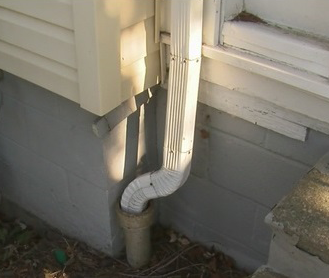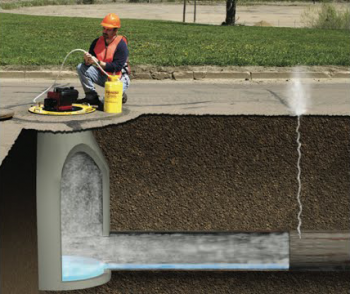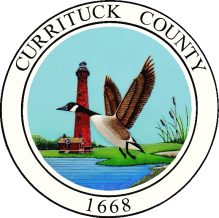Sewer Service Maintenance
Sanitary Sewer Service Information Brochure (PDF)
 Currituck County is responsible for the operation and maintenance of the collection system up to the homeowner’s property line.
Currituck County is responsible for the operation and maintenance of the collection system up to the homeowner’s property line.
Proper use of the sanitary sewer system is important to the longevity of the service and infrastructure. Wastewater generally consists of used water from toilets, bathtubs, and sinks. Certain items can be detrimental to the collection system and wastewater treatment plant.
Do Not add the following to the sanitary sewer system:
- Fats
- Oils
- Grease
- Clothes
- Rags
- Diapers
- Nuts
- Bolts
- Screws
- Gasoline
- Motor oil
- Medicines
Issues
Flooding events have negative impacts on the Moyock Regional Wastewater Treatment System due to Inflow and Infiltration (I&I). This term describes the ways stormwater and groundwater enters into the sanitary sewer system.

Inflow
Water that enters into the sanitary sewer system from above-ground sources (e.g. stormwater).
Sources include:
- Manhole covers
- Roof drain
- Clean-out connections

Infiltration
Water that enters into the sanitary sewer system from below-ground sources (e.g. groundwater).
Sources include:
- Defective pipe joints
- Cracked pipes
- Collapsed pipes
Inflow & Infiltration (I & I)
I & I is a problem because it:
- overloads the capacity of the wastewater treatment plant
- reduces the effectiveness of the treatment process
- causes raw sewage to backup into homes and streets
Testing Sewer System
 Periodically Currituck County will smoke test the collection system to find sources of Inflow & Infiltration.
Periodically Currituck County will smoke test the collection system to find sources of Inflow & Infiltration.
This common, non-toxic test will allow the County to identify problem areas in the system to repair or replace. Additional information will be sent out prior to testing. Residents should take this time to fix any known problems on their property that can contribute to Inflow & Infiltration problems.
Examples of problems could be broken plumbing or missing cleanout cap.
Homeowners found with any deliberate source contributing to Inflow & Infiltration may be fined. By Currituck County Code of Ordinances, Section 13-139, draining stormwater or groundwater into the sanitary sewer system is prohibited. Fines for illegal connections can be up to $1,000 per day per violation.
Questions & Answers
-
What is smoke testing? How does it work?
Smoke testing is a safe, cost effective-way to identify problem areas in the sanitary sewer system.
This test consists of blowing a smoke-like product into a manhole and observing the points where smoke appears. These points might indicate:
- cracks in sewer lines,
- defective sewer connections,
- cross-connections with stormwater drains,
- or building connections without proper drain traps or cleanouts.
The smoke is expected to exit from manholes on the streets and the roof vent pipes on top of your house.
-
Why is the County smoke testing in this area?
Currituck County Wastewater Department has experienced negative impacts on the Moyock Regional Wastewater Treatment System due to Inflow and Infiltration (I&I), which is when stormwater and/or groundwater enter into the sewer system.
Inflow and Infiltration is a problem because it overloads the capacity of the wastewater treatment plant, reduces the effectiveness of the treatment process, and can cause raw sewage to backup into homes and street. Finding sources of the problems will allow the Wastewater Department to make necessary repairs at a later time.
-
Is the smoke harmful?
No. The ‘smoke’ is a non-toxic, odorless substance and is harmless to:
- people,
- pets,
- food,
- furniture,
- appliances,
- and equipment.
It is also does not stain or leave any residue. Additional safety information on this smoke product can be found on the company’s website.
-
Is the smoke a fire hazard?
No. The smoke is not flammable and does not create a fire hazard.
-
What do I need to do to prepare my home for smoke testing?
It is recommended that all drain traps have some water in them. You can let you your faucet run for few seconds or pour at least one cup into the drain. This will help block the smoke.
-
Do I need to be home during this test?
No. County employees conducting this test will be outside to document where smoke is coming from.
At no time will County employees need to enter any homes during this test.
-
What if I have pets in my house during testing?
If your pets will be inside during this test and you are concerned about smoke entering your home, it is recommended to have some windows open or make other arrangements for their boarding somewhere else.
-
What do I do if smoke enters my home?
If you believe the smoke in your home is from a FIRE, CALL 911.
Smoke will dissipate in about 20 minutes with proper ventilation or opening windows and doors.
-
If smoke enters my home, will it set off the smoke detector?
It can if there is a very bad leak (which will allow a lot of smoke in the house) and it is near the smoke detector. Otherwise, it probably will not set it off.
-
I filled my drain traps but the smoke still entered my house. What should I do?
This means there might be a problem with your plumbing somewhere that could be letting sewer gases inside your house, which can be caused by:
- leaks in your plumbing,
- a sewer vent that vents to your attic or inside your house,
- a faulty seal (e.g. toilet wax ring),
- or a missing sink or drain trap.
It is recommended to note the location of the smoke and to have your plumbing looked at by a plumber.
-
I have cut off water to my house for the winter and cannot get there to prepare for this test, what should I do?
Currituck County staff understands some homes are not permanent residences and homeowners have not been there for some time, leaving all drain traps and toilets completely dry. This can lead to smoke entering the house during testing. It is ultimately the homeowner’s decision on how to address this but if smoke does enter the home, it will eventually dissipate and will not harm anything.
-
What happens after smoke testing is complete?
The County will post notices, updates and information on the Currituck County website.
-
Who can I call if I have any more questions?
Public Utilities DirectorWill Rumsey252-232-6065Wastewater SuperintendentRod Holley252-232-6062County EngineerEric Weatherly, P.E.252-232-6035Engineer TechnicianNick Ingold252-232-6048

